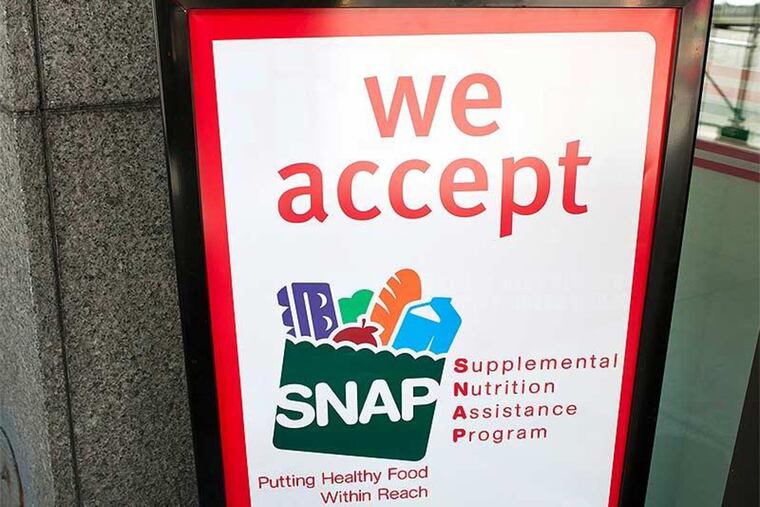Access to SNAP benefits restored after six-hour outage on Sunday
It’s not clear how many people were inconvenienced, or why the glitch in service occurred.

Access to food stamps has been restored after a six-hour period Sunday during which nearly 500,000 Philadelphians — and almost 2 million Pennsylvanians — were potentially unable to use the benefits to shop for food.
More than 700,000 people in New Jersey were potentially impacted, as well as around 69,000 households in Delaware.
It’s not clear how many were inconvenienced, or why the glitch in service occurred, state officials said on Monday.
What is known for certain is that between approximately 12:30 p.m. and 6:30 p.m. Sunday, a service disruption prevented low-income people in more than 20 states from using their Electronic Benefits Transfer cards (EBT) to access food stamps, now known as SNAP benefits, for the federal Supplemental Nutrition Assistance Program.
» READ MORE: Philly nonprofit links people in need with benefits they don’t even know they deserve
On Monday, a spokesperson for the Pennsylvania Department of Human Services said that Conduent, a national company that processes SNAP transactions in multiple states, including Pennsylvania, New Jersey, and Delaware, “experienced service disruption.” The spokesperson added that DHS “awaits a final report” from Conduent.
“A lot of the country was out for a substantial amount of time,” said Ellen Vollinger, legal director of the Food Research & Action Center in Washington, D.C., the nation’s largest antihunger lobby. “This was no blip.”
Both DHS and the U.S. Department of Agriculture, which administers SNAP benefits, referred questions about what happened to Conduent, which serves nearly half the states in the nation.
Contacted Monday, a spokesperson for the company said only that a team “has been able to successfully restore all impacted services pertaining to this matter.”
» READ MORE: Inflation, supply-chain disruptions are hurting Philly food banks and low-income people
Stacy Dean, the USDA undersecretary for food, nutrition and consumer services, said Monday, “USDA understands how stressful it can be when individuals and families are unable to use their benefits to purchase the food they need.”
One Philadelphia advocate said that several people who were shopping on Sunday had to abandon their carts and leave the stores once they learned their EBT cards didn’t work.
“It was really crazy,” said the advocate, who asked for anonymity because they didn’t have permission from their organization to speak publicly. None of the shoppers contacted would comment.
A spokesperson for Acme Markets said the company didn’t know how many shoppers in its stores had been affected, adding that Sunday is traditionally the heaviest food shopping day of the week.
Alex Baloga, president and CEO of the Pennsylvania Food Merchants Association, could not be reached for comment.
Katie Milholin, director of policy and education for the Greater Philadelphia Coalition Against Hunger, said that its SNAP hotline, normally open for questions, had been closed on Sunday. She added that the agency received no complaints Monday.
A spokesperson for the Food Bank of South Jersey said that it had received only “a couple of calls” about the issue.
Similarly, Suzan Neiger Gould, executive director of Manna on Main Street, the hunger-fighting nonprofit in Lansdale, said that she’d heard little from clients about the EBT outage.
But, she said, there might be a good reason: By the third week of every month, most SNAP benefits in the area run out.
“People may have already been out of benefits, and unable to shop on Sunday, three days before the end of the month,” she said.